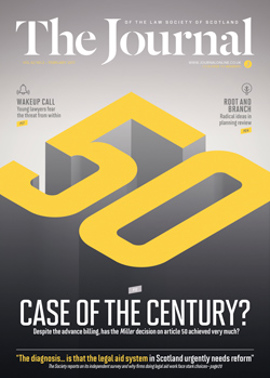Helpline plus

The name is the same, but wholesale change has otherwise been the story of the Law Society of Scotland’s Professional Practice team over the past year or so.
All, that is, if you count Fiona J Robb as a new joiner. (The middle initial distinguishes her from another Fiona Robb on the Society’s staff.) Having first come to the Society in 2003 after 10 years in private practice, she moved to Professional Practice in 2005 as a team solicitor. She resumed practitioner life a year ago, but when the post of Director became vacant soon afterwards, she had little hesitation in applying: “I was really excited by the role and felt I could bring a lot to it.”
Team lineup
Currently assisting her are three senior solicitors, each with a different background and each also taking responsibility for one of the Society’s representational committees. Having differences is regarded as particularly welcome given that enquiries come from all areas of the profession including those employed in larger firms, high street, sole practitioners and in-house lawyers.
Matthew Thomson transferred from the Society’s policy team, where he dealt with criminal legal aid negotiations, and now takes on the Technology Committee including work on cybersecurity.
Russell Eadie, formerly an employment partner at Morisons in Edinburgh, is now responsible for the Civil Justice Committee and in particular the Taylor report reforms, such as contingency fees and qualified one-way cost shifting.
Gillian Alexander, who was a conveyancing associate at Cartys, Hamilton, now looks after the Property Law Committee. Much of her current work concerns the Altis online platform for property transactions, as well as possible new guidance aimed at reducing delays in concluding missives.
The team is also looking to recruit a paralegal, to further the Society’s Registered Paralegal scheme. “We are keen to encourage takeup, as it has benefits for firms because of the standard of training or achievement that registered paralegals have,” Robb comments. “Bringing a registered paralegal into Professional Practice to champion the cause will help more solicitors and firms better understand the benefits the scheme offers. We believe that the Registered Paralegal status adds value to the legal market by ensuring that those who undertake important work in support of solicitors meet high standards.”
Mission to engage
These all sound like quite big responsibilities, in addition to the core focus of the team, which remains unchanged: free advice on professional ethics and practice which all members can access. But while dealing with such enquiries is still the team’s main objective – last year they answered an estimated 7,000 phone enquiries and another 2,000 written queries on top – Robb is aware that they are also “in a good position, as solicitors who have recently been in private practice, to support some of the work done by the Society’s representational committees”.
Another aim is to develop more “tailored engagement” with solicitors in some of the larger firms, “because we were conscious that there are solicitors in there who don’t have much contact with the Society between one practising certificate renewal and the next, so the senior solicitors are making contact with specific firms and discussing greater contact with the Society”.
You could label the team’s advice work as falling under either representation or regulation, but Robb reminds me that she and her colleagues operate under a confidentiality protocol, which means that solicitors do not have to disclose their identity or location when they make a call, “and unless they are actively involved in an issue that would have an implication on the Client Protection Fund, we are under no obligation to tell our colleagues in regulation anything about the call”.
It also remains the case that the team offers guidance and advice, rather than issuing instructions: it is the member’s decision how to act on the response received. However, if they have sought guidance and followed it, as most do, that will stand them in good stead in the event of any later challenge to their actings; conversely, if they sought but then ignored any guidance, that would also be taken into account in any subsequent inquiry.
The Society is aiming to expand its member services in pursuance of its Leading Legal Excellence strategy and current annual plan, and Professional Practice has some upcoming developments to look out for, which should improve its accessibility to solicitors.
One is offering timed appointments in addition to the traditional call enquiries. “Sometimes getting hold of people can end up as a game of telephone tennis,” Robb explains, “and we will provide the opportunity for a solicitor to book a time to speak to someone about a given topic, so that the person they are speaking to has an opportunity of researching it and coming to the meeting fully prepared. Initially this will be done through email, but ultimately digitally with people giving details and arranging a time at which we will phone them. It should be particularly useful for firms that want a call in with two or three people on a conference call.
“We’re also developing frequently asked questions that we will put on the members’ area of the website; there will be more self service about some of the commonly raised issues. And we’re working closely with colleagues in CPD to identify topics that should perhaps be covered in training.”
Hot topics
Asked about other challenges facing the team at present, Robb mentions the issues thrown up by the Discipline Tribunal case of Campbell in 2013 and the guidance that followed (Journal, December 2013, 30; November 2015, 40), relating to solicitors acting as executors and agents in relation to legal rights where a client does not wish a potential beneficiary to be informed of their entitlement. Further questions have arisen over the position where a solicitor is advised that a deceased was father to a child who believes they have a different father. “It’s an interesting ethical question that solicitors could be put in a situation where they may be blowing apart someone’s family circumstances in relation to the opportunity to make a legal rights claim,” Robb observes.
Work is ongoing in relation to confidentiality and legal professional privilege, “because I think some of the guidance hasn’t necessarily kept pace with decided cases, and it’s something we are actively looking at to make sure what we are saying is current”.
Confidentiality is a recurring theme of calls to the helpline, as is conflict of interest – both will be covered when the FAQs appear on the website in a couple of months’ time. Suspicious activity reports (SARs) also generate a lot of enquiries. “There is still a misunderstanding on the part of solicitors about whether they are seeking consent to proceed or whether they are doing it for intimation purposes. Problems are also caused by firms failing to undertake all the necessary due diligence to turn concerns into ‘suspicions’ and determine whether a SAR should be submitted.”
Brexit makes its presence felt too. “There’s still a kind of fallout in relation to people looking to qualify in other jurisdictions, and indeed following some of the changes to personal injury work in England & Wales there are English solicitors looking to open offices in Scotland because of the differences in the way contingency fees are dealt with here.”
Broad remit
Other projects again relate to matters other than the provision of individual advice. “We are developing a robust process relating to the appointment of arbitrators and adjudicators. Some contracts are written on the basis that the President of the Law Society of Scotland is responsible for the appointment under an arbitration clause, and we are looking to have a panel of possible appointees in place to support this. Once that is in operation we see it as an opportunity for solicitors to showcase skills to resolve contractual disputes.” This fits with the Society being an appointing body under the Arbitration (Scotland) Act 2010.
Finally, of potential interest to any practice, the team is involved in developing the successor to the Cost of Time survey, the financial benchmarking study last conducted in 2014 and which is due to be launched in the spring.
Once again, firms will be able to obtain confidential individual reports based on financial information they provide, and use these to measure their performance (against their own previous years and against figures for their sector), compare costs, and inform business planning. This is another “Watch this space” topic.
It all adds up, I suggest, to a much broader team role than the traditional one with which the profession is most familiar. “I think it is that,” Robb replies, “and certainly it has always been more than that reactive, end-of-telephone role, but trying to get ahead and see what the trends are, what are the issues, and if need be put out guidance or advice or write an article. The role is expanding, but that is only for the good because it means we are speaking to more solicitors and getting a better feel for what is going on, and that’s pretty central to what we are trying to do.”
A resource, for those who know
A majority of solicitors are reasonably aware of the work of the Professional Practice team, and a third have used its services for phone or email advice in the past 12 months, according to the latest Ipsos MORI survey of members carried out for the Society – but still there are many who admit to knowing “not very much” (35%) or “nothing at all” (8%) about how the team can help them.
Those who did consult the team reported very favourably: 67% were very satisfied, and 32% fairly satisfied, with the ease with which they could get advice; corresponding scores for helpfulness of the people contacted were 76% and 21% respectively, and for overall quality of service 65% and 30% respectively.
Team solicitors still hope to use their roles in going out and speaking to members to help to improve the overall quality of the service that they provide.
In this issue
- Miller, Brexit and BreUK-up
- Power to the people?
- Prerogatives, Parliament and the constitution: plus ça change?
- Decisions in high places
- Reading for pleasure
- Journal magazine index 2016
- Opinion: Callum Sinclair
- Book reviews
- Profile
- President's column
- Have you heard of ScotLIS?
- People on the move
- Article 50: the final say
- Where courts fear to tread
- "Wake up": how young lawyers see the future
- How healthy is our legal aid system?
- Challenging assumptions
- Planning to deliver
- Contact and the fear factor
- And the bill goes to...?
- Pakistan to join Child Abduction Convention
- Dress to impress?
- Handcuffing of prisoners and article 3
- Turning up the heat on workplace change
- Scottish Solicitors' Discipline Tribunal
- Not just for the green welly brigade
- Five by five
- Law reform roundup
- Relief over pensions and bankruptcy ruling
- Helpline plus
- Spill the beans on legal aid fraud
- The art of bringing the good news
- Cybercrime: how are you protected?
- Ask Ash
- One year rule becomes three
- From the Brussels office






